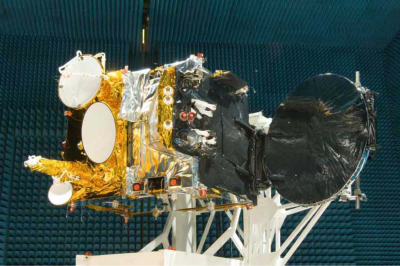Expert: Florida Explosion Augurs Problems for Israeli Satellite Business

The explosion that destroyed Israel’s advanced Amos 6 satellite means that Israel’s space industry is down, but certainly not out, according to Tal Anber, Director of the Fisher Institute for Air and Space Strategic Studies. “Israel Aerospace Industries, which built Amos 6, is already planning a replacement, which may be ready in two years or even less,” he told Channel Two Friday. “That, of course, is on the assumption that SpaceCom, or whoever buys the company, decides to buy an Israeli satellite after this.”
The $200 million Amos 6 advanced communications satellite that was set to take off over the weekend exploded and was completely destroyed as it was being refueled on its Cape Canaveral launchpad. Investigators have not yet ascertained a definitive cause for the explosion of the SpaceX rocket that was to lift Amos into its orbit, but a problem in the fuel line is suspected. The satellite was to have been used by Israeli communications companies, including Bezeq and Yes, as well as a slew of foreign companies, including Facebook, which was planning to use the satellite to build a wireless data network throughout northern and central Africa.

“It’s too early to tell if terrorism or sabotage was involved, but the likelihood of that is very low,” said Anbar. “This kind of explosion on the ground is very rare. Unfortunately the timing of this incident is very bad for the Israeli space industry,” he said. “The Israeli satellite industry has had its share of troubles lately, and currently IAI has no new satellites under order.”
The Amos 6 satellite was supposed to replace the Amos 2 satellite, launched over a decade ago and nearing the end of its lifespan. “All companies that launch satellites take into account the possibility of a major problem that will prevent launch, and they have backup plans. The companies that are renting communications lines on the satellite will be provided for by SpaceCom, the company that administers the Amos communication system.”
This is the second major setback for SpaceCom in less than a year. In November 2015, the company’s Amos 5 satellite was “lost,” and all communications with it ceased. At the time, a consortium of insurance companies were involved in paying off the losses to SpaceCom, and it is presumed that a large group of insurers will compensate the company for its damages this time as well.
In this instance, SpaceCom was a customer of SpaceX, the company that was to place the satellite in orbit, and a court fight is expected over which parties SpaceCom will collect its compensation from. In futures trading both on the Tel Aviv Stock Exchange and the NASDAQ, SpaceCom shares were down by 8.9 percent. On Friday, the company will make an official statement to NASDAQ about the explosion and potential damages to the company, and a similar statement will be made to the TASE when it reopens on Sunday for trading.
SpaceCom recently closed a deal to sell itself to Beijing satellite firm Xinwei Technology Group for $285 million, but observers said that the Chinese firm could reconsider the deal. According to Globes, the deal depended, among other things, on the successful launch of Amos 6.
The deal reflected a premium of 41 percent to Spacecom’s average stock price in the past month but after the explosion, its shares closed percent down on the Tel Aviv Stock Exchange.
The Israeli company issued a statement to the Israeli stock exchange saying the “total loss” of the satellite “will have a significant impact on the company.”
To Read The Full Story
Are you already a subscriber?
Click "Sign In" to log in!

Become a Web Subscriber
Click “Subscribe” below to begin the process of becoming a new subscriber.

Become a Print + Web Subscriber
Click “Subscribe” below to begin the process of becoming a new subscriber.

Renew Print + Web Subscription
Click “Renew Subscription” below to begin the process of renewing your subscription.












